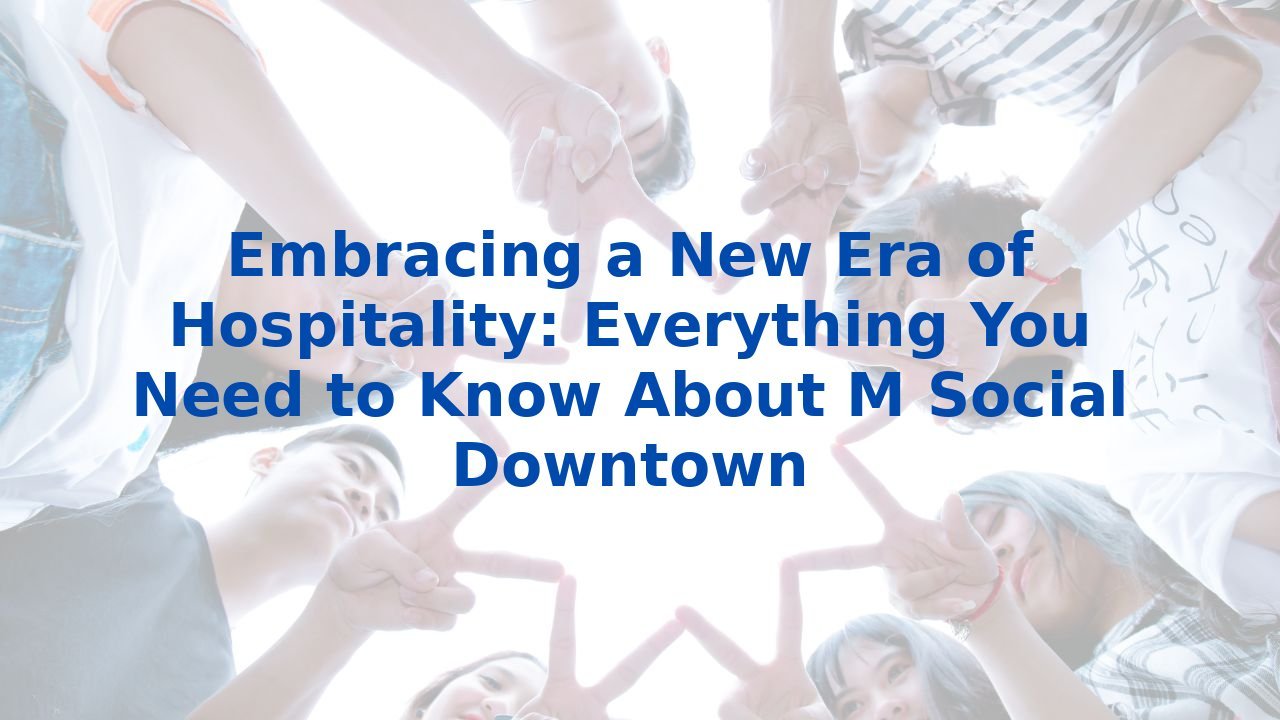Embracing a New Era of Hospitality: Everything You Need to Know About M Social Downtown
Embracing a New Era of Hospitality: Everything You Need to Know About M Social Downtown
The hospitality industry stands at a crossroads—a vibrant intersection of tradition and innovation. As guests seek personalized experiences and seamless operations, hotels must adapt to a new era where technology and exceptional service go hand in hand. One of the most transformative tools at our disposal is artificial intelligence (AI), which offers exciting possibilities for improving operational efficiency. Let’s explore how AI can elevate the hospitality experience and why empowering employees through training is essential for successful integration.
1. Increasing Efficiency in Hospitality Operations
One of AI's standout features is automation. In a bustling hotel environment, time is of the essence. Tasks such as check-ins, room assignments, and guest inquiries can be automated, allowing staff to focus on providing a genuinely memorable experience. Think about the front desk: AI can streamline check-in processes, enabling guests to settle in without unnecessary delays. The result? A smoother experience for guests and a more efficient workflow for staff.
“The melding of hospitality and technology isn't just about efficiency; it’s about creating meaningful connections.”
2. Enhancing Guest Experiences
Today’s guests crave personalized interactions. AI enables hotels to gather and analyze data on guest preferences, allowing for tailored recommendations and customized experiences. Imagine an AI system that remembers a guest’s favorite room temperature or dietary preferences, enhancing their stay with minimal effort from the staff. This nuanced understanding fosters loyalty, turning a moment of service into a lasting relationship.
3. Prioritizing Safety and Reliability
Beyond operational efficiencies, AI significantly enhances safety. In hospitality settings, safeguarding both guests and staff is paramount. With AI analytics, hotels can monitor real-time safety metrics and spot potential risks. For instance, AI can analyze patterns from security feeds, flagging unusual behavior. By acting on these insights, the hotel can mitigate risks before they escalate, creating a secure environment for everyone.
Moreover, AI improves reliability by minimizing errors in operations. Routine maintenance of hotel amenities can be optimized through predictive maintenance powered by AI. Knowing in advance when a system may fail ensures that guests enjoy all aspects of their stay without interruptions.
4. Empowering Employees Through AI Training
The transition to an AI-enhanced hospitality experience doesn't just happen overnight. It requires a workforce well-versed in these technologies. Training employees to effectively leverage AI tools is not merely an investment in technology but a commitment to enriching the workplace environment. When employees understand how to interpret data and utilize AI-driven insights, they can elevate their contributions, ensuring that technology amplifies human touch rather than replaces it.
For example, staff trained in AI can deliver personalized services with greater ease, unlocking potential that neither technology nor human effort could achieve alone. By fostering a culture of continuous learning, hospitality organizations can empower their employees to adapt to changing demands while enhancing job satisfaction. This holistic approach cultivates a workforce that operates at the forefront of the hospitality revolution.
5. Real-World Applications in Hospitality
The integration of AI into hospitality has already shown vast implications. Here are a few real-world applications:
- 24/7 Customer Service: AI chatbots are transforming customer support, handling inquiries day and night, thus freeing human agents to tackle more complex issues.
- Dynamic Pricing Models: AI systems can analyze market trends and adapt pricing in real-time, ensuring hotels remain competitive yet profitable.
- Efficient Housekeeping: AI can assist in managing housekeeping schedules based on guest check-ins and needs, further enhancing operational efficiency.
Conclusion: A Future Driven by Innovation
In this new era of hospitality, it is clear that embracing AI is more than just an operational upgrade; it is a fundamental shift in how we view guest satisfaction and employee interaction. By automating tasks, improving safety, and personalizing experiences, AI enhances the day-to-day interactions with guests and staff alike. But for these advancements to flourish, investing in employee AI training is essential. This commitment not only enhances productivity but also nurtures talent and boosts morale.
As we anticipate the future of hospitality, it is essential to remember: the heart of service remains human. With AI by our side, and our teams equipped to harness its potential, we’re not just creating a more efficient operation but nurturing a culture of innovation and care. The journey has begun; let’s step forward together into this exciting new era.



